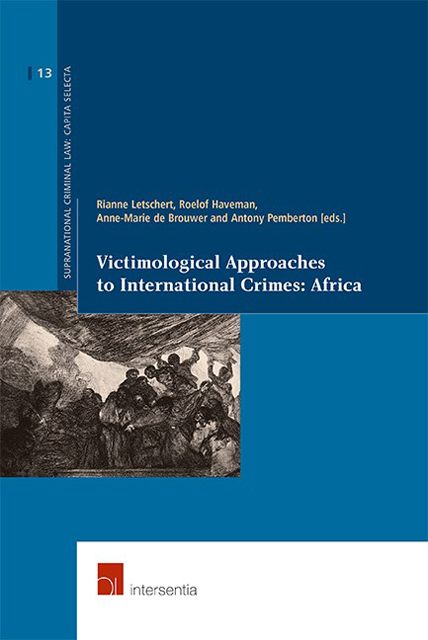Book contents
- Frontmatter
- Words of Appreciation
- Contents
- Introduction: Victimological Approaches to International Crimes
- Part I Victims of International Crimes
- Part II Reparative Justice
- PART III Amnesty, Truth, Reconciliation and Tradition
- Part IV International and National Legal and Policy Approaches
- Part V Victimological Approaches to International Crimes
- The Authors
- Bibliography
Introduction: Victimological Approaches to International Crimes
Published online by Cambridge University Press: 24 November 2022
- Frontmatter
- Words of Appreciation
- Contents
- Introduction: Victimological Approaches to International Crimes
- Part I Victims of International Crimes
- Part II Reparative Justice
- PART III Amnesty, Truth, Reconciliation and Tradition
- Part IV International and National Legal and Policy Approaches
- Part V Victimological Approaches to International Crimes
- The Authors
- Bibliography
Summary
In 2009, the International Victimology Institute Tilburg (INTERVICT/Tilburg University, the Netherlands), in collaboration with Together Against Impunity in the Great Lakes Region (TAI/GLR) (a Rwandan NGO focusing on victims’ rights), The Legal Aid Forum (a platform with member organisations engaged in the provision of legal aid services to indigent and vulnerable groups in Rwanda) and Ibuka (the umbrella organization for genocide survivors organizations in Rwanda), organized a five days international conference in Kigali, Rwanda, on developing victimological approaches applied to international crimes – genocide, crimes against humanity and war crimes – with a focus on Africa. A mix of academics and practitioners participated in the conference, composed of a combination of insiders describing the processes they helped establish and guide outsiders with more theoretical expert knowledge on these processes. The speakers came from different academic disciplines and from all over the world. Moreover, several speakers of Rwandan NGOs, universities and governmental organizations were invited who shared their experiences coming from a country in which genocide took place so recently. The valuable input from representatives of NGOs enabled to combine the academic perspective with ref ections from people working on the ground. In addition, the visits to various genocide memorials left an unforgettable impression on the participants and enriched our understanding of the complexities at hand. This book contains the results of the conference in four clusters, which ref ect the conference themes.
The wide range of topics addressed was instrumental in guaranteeing in-depth and constructive discussions on developing victimological approaches to international crimes. Correcting the unsettling observation that one stands a better chance of being tried and judged for killing one human being than for killing 100,000 has been a driving force behind the (international) criminal justice initiatives focusing on international crimes. The establishment of the International Criminal Tribunal for the former Yugoslavia (ICTY) in 1993, followed a year later by a sister institution for Rwanda (ICTR), signalled the first steps of the global community in addressing these crimes. The move was later replicated in the form of internationalized tribunals, such as those for Sierra Leone, Cambodia, East Timor and Lebanon.
- Type
- Chapter
- Information
- Publisher: IntersentiaPrint publication year: 2011

